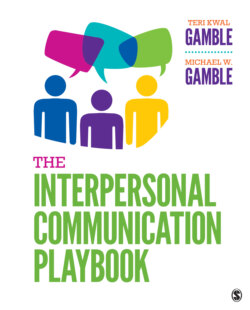Читать книгу The Interpersonal Communication Playbook - Teri Kwal Gamble - Страница 19
На сайте Литреса книга снята с продажи.
Interpersonal Communication is a Lifelong Project
ОглавлениеThe effectiveness of interpersonal relationships depends on the extent to which we practice and exhibit interpersonal skills. While we may be born communicators, we are not born with effective interpersonal skills—those we need to learn. Nor are effective skills static; the same techniques may not work for all people in all situations. The culture of each person, his or her gender, the environment, and the individual’s goals will determine how that person approaches and processes interpersonal communication.
Just as every person represents a unique combination of physical, psychological, education, gender, and cultural characteristics that distinguish us from one another, each new relationship teaches us a little bit more about the nature of people and interpersonal communication. Each new relationship increases our comfort at interacting not only with those who share our characteristics, but also with those whose attitudes, life experiences, and perspectives differ from ours.
Try This: Strangers at the Door?
When you were a young child, your parents and/or caregivers probably cautioned you not to speak to strangers. However, travel opportunities and social networks such as Facebook make interacting with strangers much more commonplace, even ordinary. Answer the following questions:
1 In which arena are you more willing to interact with a stranger: online, at the mall, or when taking public transportation? Explain.
2 How does the anonymity or privacy of online relationships increase or decrease your level of personal comfort?
3 In your opinion, which is more likely to result in a lasting interpersonal relationship—a friendship that begins online, or a relationship that begins with the parties face-to-face? Explain your answer.
As we grow and learn, we should continually revise and update our personal theories of what works during interpersonal contacts, or our assumptions will compel us to repeat interpersonal scenarios or scripts that are doomed to fail. The effective interpersonal communicator does not take others or the means of communicating for granted. Instead, he or she attempts to continually enhance communication presence.
Our sense of personal identity results from and influences our interpersonal relationships. When we do it well, interpersonal communication helps us work through problems, and enhances our feelings of self-worth. When we do it poorly, however, personal growth and achieving our unique potential may be frustrated.
Whether an interpersonal relationship is productive or not depends on how satisfying it is and how much attention we pay to its health. Having good interpersonal skills can mean the difference between happiness and unhappiness or success and failure in multiple life contexts—home, job, school, health care settings, and society—as well as across cultures and generations. Enhanced understanding of the factors in play when two people communicate, whether in a personal or a professional relationship, increases the chance of developing interpersonal competence—the ability to communicate effectively.5
As you read the rest of this chapter, consider the following questions about yourself:
How effective am I at communicating with people from diverse cultures?
Am I equally effective interacting with men and women and with individuals whose sexual orientations differ from my own?
How easy is it for me to develop relationships with people my own age and those of different ages?
To what extent am I able to maintain self-control when I interact with others? Under what conditions do I lose control?
How and to what extent do I use technology in my interpersonal relationships? In what ways is technology changing my interpersonal communication?
